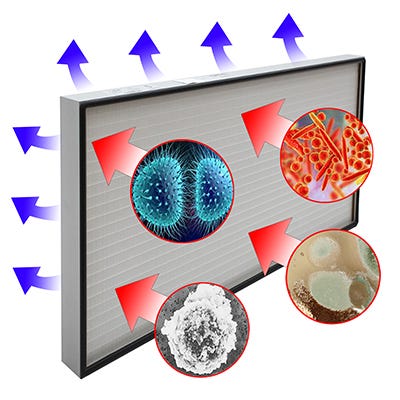In addition to face masks, properly maintained air filters remain crucial in confined indoor spaces to help mitigate the spread of COVID-19 (SARS-CoV-2 virus). Both HEPA filters and ULPA filters reduce the number of microscopic particles in the air, which can keep air safe to breathe in places it’s needed most like hospitals, isolation rooms and crowded indoor areas.
COVID-19 virus spreads through the air on respiratory droplets created from talking, coughing, sneezing, and even breathing. When these activities occur in a populated space with stale air, the likelihood of transmission can significantly increase, as COVID-19 has been proven to remain viable for at least 3 hours lingering in the air or on surfaces up to four meters away from its last host.
Masks and social distancing significantly reduce the chance of the virus’s spread, but in some spaces additional measures may be needed. Recent findings suggest the best chance of containing COVID-19 in crowded indoor spaces is to implement high-quality air filtration to whisk viral particles away before they have a chance to infect others in the room.
Air filtration keeps respiratory droplets and other airborne particles moving in an enclosed space. A virus-deterring HVAC system will effectively circulate and filter out any unwanted particles, and return clean air to the facility or pump it outside to allow fresh air to move inside.
Businesses and healthcare facilities can modify existing HVAC systems to include a fan filter unit capable of removing COVID-19 from the air.
A cleanroom HEPA filter and ULPA filter are both designed to contain microscopic pathogens and hazardous particles. A fan filter unit (FFU) houses either a HEPA filter, which catches 99.99% of particles 0.3 microns, or an ULPA filter, which catches 99.999% of particles 0.12 microns. The COVID-19 virus is about 0.125 microns, but it can ride on respiratory droplets that are much larger, which both the HEPA and ULPA filter can trap.
When masks and social distancing can be used in tandem with a HEPA- or ULPA-filtered FFU, the risk of transmitting or catching the virus is greatly diminished.
Can HEPA Filters Capture Coronavirus (COVID-19)?
A HEPA (High Efficiency Particulate Air) filter is 99.99% effective at catching particles down to 0.3 microns. SARS-CoV-2 is 0.12 microns, so a HEPA filter cannot guarantee to remove all the tiny airborne viral particles. Still, HEPA filters are capable of capturing some portion of these smaller particles via methods of direct impact, interception, or diffusion. They can also effectively capture larger particles the virus might be clinging to that are in the 0.3 micron range. For instance, when COVID-19 hitches a ride on larger specks (large droplets or dust for example), both the virus and larger particle can get captured in the filter medium. For these reasons, many hospital air purifiers use HEPA filters to help mitigate the spread of infection in crowded areas such as hallways and patient rooms.
What other types of air filtration protect against Coronavirus?
An ULPA (Ultra Low Penetration Air) filter, on the other hand, is 99.999% effective at catching particles down to 0.12 microns. Yes, an ULPA filter can effectively strip COVID-19 from the air itself, though it is still not a 100% guarantee. Because the filter medium is so fine, it reduces the speed at which air can flow through it, which may make ventilation a challenge. Many hospital air filters use ULPA filtration in operating rooms and intensive care units. Seriously ill COVID-19 patients are often treated in ICUs, and the particles hanging in the air there can be transferred via staff to other parts of the hospital if they are not contained. This is why medical air filters and hospital air filtration are so necessary to aid in the battle against COVID-19.
Using UV-C Sterilizing Module as a disinfectant against COVID-19

The potential for UV-C sterilization to supplement other disinfectants in removing SARS-CoV-2 is promising. In the wake of supply shortages, where standard methods of cleaning are temporarily inaccessible, UVC light can clean any surface the light touches.
The light disinfects the surrounding environment by permanently damaging the DNA of any exposed germs, which kills them in the process. With the proper exposure, it is 99.9% effective at killing the viruses and bacteria it encounters. This could reduce the chances of exposure to COVID-19 from open surfaces and ambient air, particularly if the UV-C Sterilizing Module is attached to a fan filter unit.

Terra Universal’s air filtration systems can house a remotely-accessed UV-C Sterilizing Module. The UV light helps clean the inside of the filter face to protect against bacteria, viruses, and mold.
Terra stocks medical grade HEPA filter fan units in a wide variety of sizes and configurations. These medical grade air filtration systems can be fixed in the ceiling for positive pressure recirculation, or in a reverse flow configuration to create a negative pressure environment such as an isolation room. A portable isolation room filtration system can easily roll between rooms in hospitals, clinics, and other confined areas. This mobile hospital air purification system is suitable for both recirculation and negative pressure, so it can quickly convert any room to a negative pressure isolation room.

For more information on medical grade HEPA filter systems, or to find out more about what our fan filter unit or modular cleanroom designs can do for you, chat with our live product specialists or call (800) 578-6100 to request a free quote today!



